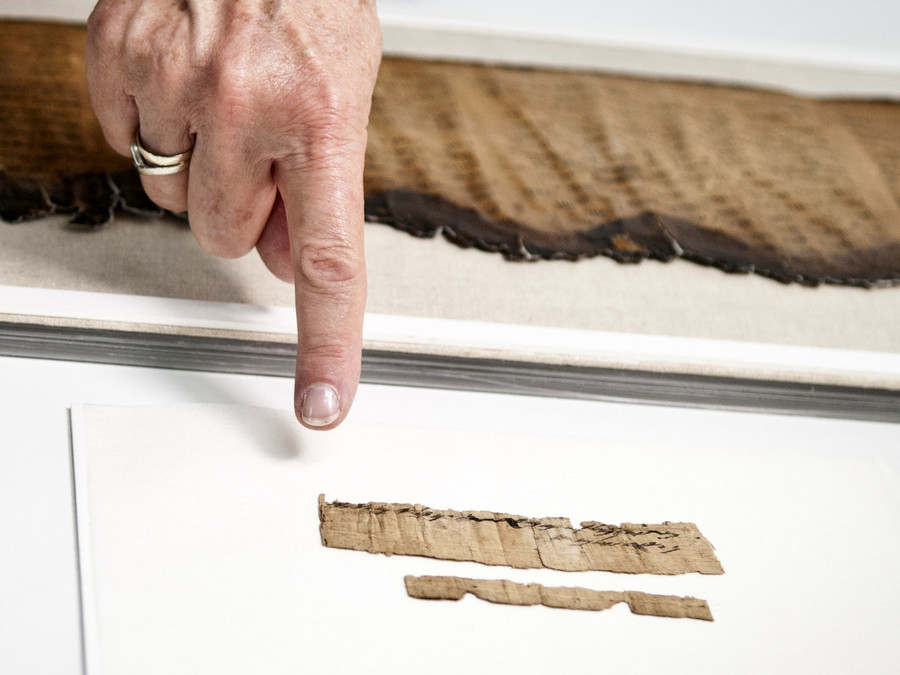Earliest reference to Jerusalem in ancient papyrus
JERUSALEM — Archaeologists unveiled a 2,700-year-old papyrus fragment, described as “the earliest extra-biblical source to mention Jerusalem in Hebrew writing” the Israel Antiquities Authority (IAA) said last week.
The find, which dates to the seventh century BCE, was written at the end of the First Temple period. It was recovered by the IAA after being plundered by antiquities thieves from a cave in the Judean Desert.
The fragment is a rare and original shipping invoice from the time of the Kingdom of Judah. It describes “the status of the sender of the shipment (the king’s maidservant), the name of the settlement from which the shipment was dispatched (Na’arat), the contents of the vessels (wine), their number or amount (jars) and their destination (Jerusalem),” the IAA said in a statement.
N’aratah on the parchment references the biblical city of Na’arot, described in the Book of Joshua as on the border between the tribal territories of Ephraim and Benjamin.
“The document represents extremely rare evidence of the existence of an organized administration in the Kingdom of Judah,” said Dr. Eitan Klein, deputy director of the IAA’s Unit for the Prevention of Antiquities Robbery.
While the fragment’s discovery serves to “underscores the centrality of Jerusalem as the economic capital of the kingdom” at the time, it’s impossible to tell which specific king (Menashe, Amon and Josiah all ruled Jerusalem at that time) was the recipient of the wine, he said.
The find is one of only two original documents from that period referencing Jerusalem as the capital city of the kingdom. Also it highlights the “unusual status of a woman in the administration of the Kingdom of Judah.” said biblical scholar professor Shmuel Ahituv.
Officials explained the extreme dryness of the Judean Desert is uniquely suited for the preservation of ancient papyrus, adding that such finds are incredibly useful in understanding life and religion in antiquity.
Archaeologists aren’t the only ones aware of the importance of such finds. IAA officials denounced the daily plundering of important historical finds and called for increased government resources for a systematic excavation of “all of the Judean Desert caves.”
Wednesday’s announcement came as the United Nations Educational, Scientific and Cultural Organization (UNESCO) passed its second resolution in less than two weeks erasing the Jewish connection to the Temple Mount and Western Wall.
Both resolutions refer to the Temple Mount and Western Wall by Arabic names rather than Hebrew ones and condemned Israeli actions on the Temple Mount, “including [those of] the so-called ‘Israeli Antiquities’ officials.”
Israeli archaeologists have spent years sifting through tons of debris removed from the site following excavations by the Waqf, the Islamic endowment that controls the site.
Other finds at the site include Herodian tiles believed to have been part of the Second Temple complex and a 3,000-year-old seal from the time of King David.
Israeli officials linked the papyrus fragment discovery with current events. Israel’s Minister of Culture and Sport Miri Regev calling it “further tangible evidence that Jerusalem was and will remain the eternal capital of the Jewish people.”
“It is our duty to take care of the plundering of antiquities that occurs in the Judean Desert, and no less important than this is exposing the deceit of false propaganda as is once again happening today in UNESCO,” she said. “The Temple Mount, the very heart of Jerusalem and Israel, will remain the holiest place for the Jewish people, even if UNESCO ratifies the false and unfortunate decision another 10 times.”
Prime Minister Benjamin Netanyahu’s Arabic language spokesman Ofir Gendelman was even harsher in his comments, calling on UNESCO to pay attention to the find, adding that the U.N. body’s World Heritage Committee “deserves to be condemned, not Israel.”
The fragment, he tweeted in Arabic, was written “1,300 years before the advent of Islam and the occupation of the Middle East by Arab invaders.”

 46.0°,
Light Drizzle
46.0°,
Light Drizzle 




